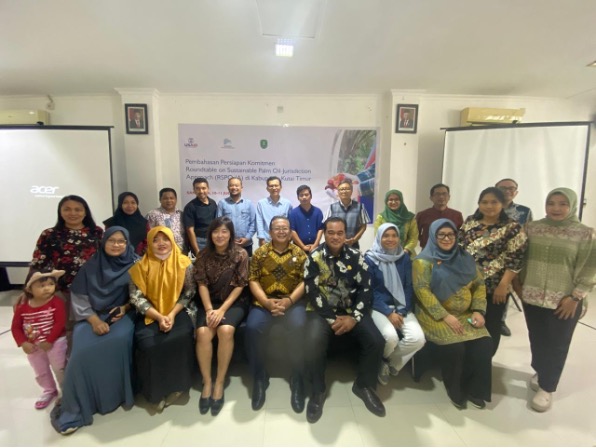East Kutai local government commits to RSPO Jurisdictional Approach and Sustainable Jurisdiction Initiative, expanding the growing network of jurisdictions working towards sustainable palm oil production in Southeast Asia.

Sangatta, East Kalimantan, September 2024: The East Kutai local government has committed to two complementary initiatives: the Roundtable on Sustainable Palm Oil (RSPO) Jurisdictional Approach (JA) and Sustainable Jurisdiction Initiative (SJI). This commitment was reinforced by the completion of two pivotal workshops, held in Sangatta and Balikpapan, aimed to explore SJI adoption as a strategy to attract green investment to East Kutai, as well as implement the RSPO JA framework to enhance sustainability in the palm oil sector.
USAID Sustainable Environmental Governance Across Regions (SEGAR) has committed to supporting the implementation of RSPO-JA, collaborating with RSPO and other donors such as German development agency, GIZ. The focus will be on advancing SJI and green investment in the region, creating a more holistic approach to sustainable development in East Kutai.
East Kutai local government’s efforts align with the ongoing projects of the RSPO-JA that is already being piloted in other Southeast Asian regions, including Sabah (Malaysia) and Seruyan (Indonesia), thus contributing to a growing network of jurisdictions working towards sustainable palm oil production and green investment attraction.
Integrating multiple stakeholders
The government-led RSPO-JA aims to transform Indonesia’s palm oil industry by focusing on enhancing local governance and integrating all stakeholders, from companies to independent smallholders, into a cohesive framework that ensures sustainable practices.
Beyond a certification process, the RSPO-JA is a comprehensive approach to making palm oil production more sustainable, by offering numerous benefits for both companies and independent smallholders while addressing significant challenges along the way.
For companies, RSPO-JA certification means enhanced market confidence. “Certification under RSPO-JA can significantly boost market trust, especially in regions that prioritise sustainable sourcing, such as the European Union,” says Didik Prayitno, the Head of Protection of the East Kutai Plantation Service. Additionally, adhering to RSPO Standards helps mitigate reputational risks associated with unsustainable practices.
Stephany Pasaribu, RSPO Stakeholder Engagement Manager, explained that the integrated certification process under RSPO-JA can provide a framework for companies to demonstrate their commitment to sustainable palm oil production and sourcing, and help companies to meet increasingly stringent regulatory requirements.
Independent smallholders also stand to gain significantly from RSPO-JA. Nurul, a local government official, notes that RSPO-JA provides essential support to independent smallholders, helping them meet stringent sustainability standards. Certification can also open doors to markets demanding sustainable palm oil, potentially increasing smallholders’ income. Stephany adds that through RSPO-JA, independent smallholders receive training and resources from other key stakeholders to enhance their agricultural practices, ensuring their long-term sustainability.
Navigating challenges
Implementing RSPO-JA is not without its challenges. Maintaining commitment and coordination among diverse stakeholders is crucial. Josi Khatarina, the Environmental Government Lead of USAID-SEGAR said that ensuring all parties’ interests are aligned and working towards common goals require effective communication and collaboration. The benefits of RSPO-JA however may take time to manifest, requiring stakeholders to commit to long-term sustainability goals. Muhammad Yani, a representative of One-stop Integrated Investment and Licensing Service of East Kutai, emphasises the importance of consistent implementation of sustainability practices across all players.
To overcome these hurdles, the RSPO-JA initiative focuses on several key strategies: (1) Strengthening governance by establishing robust local governance structures, such as Multi-Stakeholder Forums (MSFs), and securing official endorsements from local authorities; (2) Regular communication and comprehensive training programmes to ensure that all stakeholders understand and adhere to RSPO-JA requirements; and (3) Implementing rigorous monitoring and evaluation frameworks to assess compliance and progress.
Government-led programme
The RSPO-JA is fundamentally a government-led initiative, emphasising the critical role of local authorities in driving sustainable palm oil development. Stephany asserts that the government’s involvement ensures a structured approach to addressing the unique challenges faced by the industry, particularly for independent smallholders who require additional support.
Didik highlights that through strong governance, stakeholder coordination, and consistent implementation of sustainable practices, RSPO-JA aims to achieve its conservation and sustainability objectives. “As a government-led initiative, it underscores the importance of local authority involvement in driving these efforts, ensuring all stakeholders are aligned towards common sustainability goals.
Keep reading

Book Your Slot for the Additional prisma Clinic Session at RT2025

Advancing Jurisdictional Certification in Sabah: Strengthening Collaboration Between RSPO, UNDP, and Jurisdictional Approach System for Palm Oil (JASPO)
Call for Expression of Interest: Independent Investigation of a Complaint

Leading Labels: RSPO Among Top Sustainability Labels in Dutch Market

The 21st International Oil Palm Conference Successfully Took Place in Cartagena, Colombia

Top Performers of the 2025 Shared Responsibility Scorecard

ACOP 2024: RSPO Market Trends Resilient Despite Global Challenges

RSPO: Actions for the Certification of Sustainable Palm Oil Production




